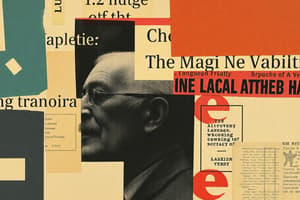Podcast
Questions and Answers
Give an example of a minority dialect.
Give an example of a minority dialect.
A dialect used by a particular minority ethnic group as a marker of identity
What are indigenized varieties?
What are indigenized varieties?
Varieties spoken mainly as second languages in former colonies with multilingual populations
Explain the formal language register.
Explain the formal language register.
Used in professional, academic, or legal settings where communication is expected to be respectful and restrained
Describe the casual language register.
Describe the casual language register.
What is the intimate language register used for?
What is the intimate language register used for?
Explain the consultative language register.
Explain the consultative language register.
What is the main difference between high-context and low-context cultures in terms of communication style?
What is the main difference between high-context and low-context cultures in terms of communication style?
Define 'non-native language variety'.
Define 'non-native language variety'.
What are 'professional field language varieties'?
What are 'professional field language varieties'?
What is a Creole language?
What is a Creole language?
How does 'language variety' influence the use of a particular language?
How does 'language variety' influence the use of a particular language?
Define regional dialect.
Define regional dialect.
What are 'lects' in the context of language variety?
What are 'lects' in the context of language variety?
What does the term 'social variety' refer to in the context of language?
What does the term 'social variety' refer to in the context of language?
Explain what 'pidgin' refers to in the context of language development.
Explain what 'pidgin' refers to in the context of language development.
What is a speech community?
What is a speech community?
What is meant by 'native language variety'?
What is meant by 'native language variety'?
Provide examples of vocabulary variations in professional field language varieties.
Provide examples of vocabulary variations in professional field language varieties.
Flashcards are hidden until you start studying
Study Notes
Language Varieties
- A non-native language variety refers to the linguistic expressions and characteristics exhibited by individuals who have acquired a language later in life or as an additional language, distinct from their first or native language.
- Language variety refers to the diverse ways in which a particular language is used and spoken by different groups of people, encompassing variations in vocabulary, pronunciation, grammar, and other linguistic elements.
- Language variety can be influenced by factors such as geographical location, social context, cultural influences, and historical developments.
Professional-Field-Language Varieties
- The language used among members of a professional field is usually different from the ones used in other fields, recognized especially with the use of jargon, specific words exclusively used in particular fields.
- Examples: medical field (epidemics, prescription, contagion), military field (brigade, radar, commander)
High-Context and Low-Context Cultures
- High-context cultures take into account the background information of the sender and receiver when comprehending messages, with nonverbal cues being very important.
- Low-context cultures prefer direct over indirect communication, with non-verbal cues not playing a significant role in the communication process.
Special Language Terms
- Pidgin: a new language that develops in situations where speakers of different languages need to communicate but do not share a common language.
- Creole: a pidgin that becomes the first language of the children or the mother tongue of a certain community.
- Regional Dialect: a variety of a language spoken in a particular area of a country, not distinct from a national language.
- Social Variety: a variety of language shared by every individual as members of a speech community.
- Minority Dialect: a variety used as a marker of identity, usually alongside a standard variety, by the members of a particular minority ethnic group.
- Indigenized Varieties: spoken mainly as second languages in former colonies with multilingual populations.
Language Registers
- A language register is characterized by the way a speaker uses language differently in different social circumstances, determined by factors such as social atmosphere, purpose of communication, audience, and context of the discourse.
- Five language registers:
- Formal: used in professional, academic, or legal settings where communication is expected to be respectful and restrained to specific rules.
- Casual: used when communicating with friends, close acquaintances, colleagues, and family members.
- Intimate: reserved for special occasions, usually between only two people and often in private.
- Frozen: historic language that is intended to remain unchanged.
- Consultative: used in conversations when people are speaking with someone who has specialized knowledge or is offering advice.
Studying That Suits You
Use AI to generate personalized quizzes and flashcards to suit your learning preferences.




